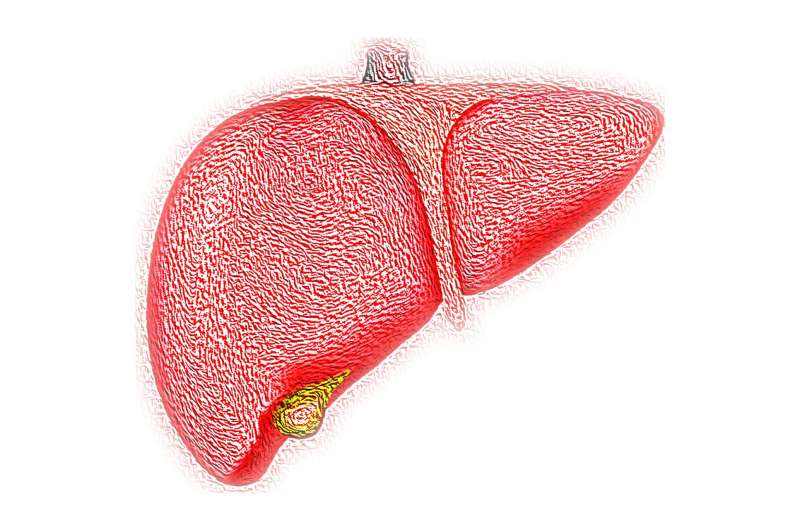Synthetic 'forever chemical' linked to liver cancer

Exposure to a synthetic chemical found widely in the environment is linked to non-viral hepatocellular carcinoma, the most common type of liver cancer, according to a new study conducted by researchers from the Keck School of Medicine of USC and published in JHEP Reports.
The chemical, called perfluooctane sulfate or PFOS, is one of a class of man-made chemicals called per- and polyfluoroalkyl substances, or PFAS. These chemicals, which are used in a wide range of consumer and industrial products, are sometimes called forever chemicals because they break down very slowly and accumulate in the environment and human tissue, including the liver.
Prior research in animals has suggested that PFAS exposure increases the risk of liver cancer, but this is the first study to confirm an association using human samples.
"This builds on the existing research, but takes it one step further," said Jesse Goodrich, Ph.D., a postdoctoral scholar in the Department of Population and Public Health Sciences at the Keck School of Medicine. "Liver cancer is one of the most serious endpoints in liver disease and this is the first study in humans to show that PFAS are associated with this disease."
Higher exposure, higher risk
The team at the Keck School of Medicine was able to use human samples collected as part of a large epidemiological study, a collaboration between the medical school and the University of Hawaii, called the Multiethnic Cohort Study. This project has followed more than 200,000 residents of Los Angeles and Hawaii for the development of cancer and other diseases.
This repository of human blood and tissue samples allowed the research team to find 50 participants who eventually developed liver cancer, evaluate the blood samples that were taken prior to their cancer diagnosis and compare these with 50 people who did not develop cancer from the same study.
"Part of the reason there has been few human studies is because you need the right samples," said Veronica Wendy Setiawan, Ph.D., professor of population and public health sciences at the Keck School of Medicine. "When you are looking at an environmental exposure, you need samples from well before a diagnosis because it takes time for cancer to develop."
Researchers found several types of PFAS in the blood samples that were taken before the participant developed liver cancer. The research revealed that the strongest association was between PFOS and liver cancer and that subjects in the top 10% of PFOS exposure were 4.5 times more likely to develop liver cancer than those with the lowest levels of PFOS in their blood.
Chemical disrupts normal liver function
The research team was also able to illuminate the possible ways in which PFOS altered the normal function of the liver. Their evaluation of the samples found evidence that PFOS appears to alter the normal process of glucose metabolism, bile acid metabolism and the metabolism of a type of amino acid called branched chain amino acids in the liver.
The disruption of normal metabolic processes in the liver can cause more fat to accumulate in the liver, a condition known as non-alcoholic fatty liver disease, or NAFLD. There has been a dramatic and unexplained rise in NAFLD around the globe in recent years, which is concerning because people with NAFLD have a much higher risk of developing liver cancer. NAFLD is expected to affect 30% of all adults in the U.S. by 2030.
Improving knowledge of health effects of PFAS exposure
PFAS, which are used in a wide range of consumer and industrial products, were first detected in the blood of people exposed to these chemicals in the workplace in the 1970s. By the 1990s, they were found in the blood of the general population, which has led to a growing awareness of the potential health risks.
Some manufacturers have phased out the use of PFOA and PFOS, but because they are long-lasting, PFAS are in drinking water, many food products and the blood of more than 98% of adults in the U.S.
Researchers at the Keck School of Medicine, led by Leda Chatzi, MD, Ph.D., professor of population and public health sciences, have conducted much of the research on the links between PFAS exposure and liver damage, liver disease, and now liver cancer. They hope to further validate their findings on the link with liver cancer in a larger study later this year.
"We believe our work is providing important insights into the long-term health effects that these chemicals have on human health, especially with respect to how they can damage normal liver function," said Chatzi. "This study fills an important gap in our understanding of the true consequences of exposure to these chemicals."
More information: Exposure to Perfluoroalkyl Substances and Risk of Hepatocellular Carcinoma in the Multiethnic Cohort: A Proof-of-Concept Analysis, JHEP Reports (2022). DOI: 10.1016/j.jhepr.2022.100550



















